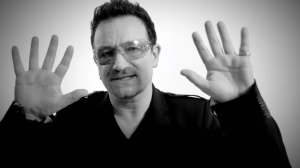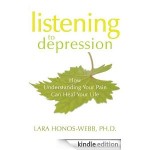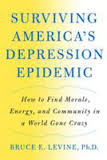Scientist have been trying to find a blood test for depression for years and it may be here. Read the News
Blood Test for Depression
Duncan’s Depression and Recovery Part of the Story
From The Washington Post, read about Doug Duncan, a politician running for office down in Maryland, and his brave struggles with depression. Read the News
Me, You, Us & Lonely
A great blog from the Depression Alliance website that speaks of the loneliness that so many with depression experience. Read the Blog
Coming to Terms: Life of a Woman with Depression
Risa Sugarman writes about her struggles with depression and being a wife and mother in The Huffington Post. Read the News
The 2014 U.S. News Job Rankings: Being a Lawyer Is Worse Than Being a Nail Technician
From the Above the Law website, sobering news indeed. Read the News
10 Ways For Lawyers to Deal With Their Depression
A lawyer with depression used to call me once a month. He’d sometimes weep as he told me about the myriad of ways that his depression was disrupting his work and personal life.
I’d listen each time, for about fifteen minutes or so. I thought I was helping him by offering a compassionate ear.
The conversation would always end with, “catch you later.”
This went on for six months.
During our talks I’d make suggestions about things he could do to help himself. It seemed to go in one ear and out the other. Despite all the pain in his life, absolutely nothing changed for him.
I finally got to the point where I said, “Bob, what are you willing to do to change your life?” He seemed surprised by the question. There was a long pause on the other end of the phone.
He then said, “Catch you later.” And he never called again.
Making a Choice to Change Things in Your Life
A hallmark of depression is that those afflicted feel that they have no choice: they victims of their depression and powerless to change it. In the final analysis, that’s what happened with Bob and why things never changed for him.
In her book, Listening to Depression: How Understanding Your Pain Can Heal Your Life , psychologist, Lara Honos-Webb, takes a somewhat unique view.
She maintains that depression isn’t just as an “illness”, but as a wakeup call; a powerful warning that we have been traveling down paths in our lives that have been untrue to who we really and, as a result, have gotten sick because it. She encourages us not to see depression as just a disease, but as an opportunity to change our lives. There is something in us, she writes, if we would only listen, that is telling us that we are killing ourselves.
But depressives, like my friend Bob, often don’t listen to the early warning signs. So that inner voice just turns up the volume until we get sick with anxiety and depression – or heart disease, hypertension and cancer.
I would like YOU to challenge a conclusion that you might have reached about yourself: that you can’t change.
I believe if you’re going to heal and grow, however, you’ll need to come to see life as a series of choices rather than inertia. Richard O’Connor, Ph.D. once said, “While you’re not to blame for your depression, you are responsible for getting better.”
What old behaviors are you willing to change or what new behaviors are you willing to try to help you get better?
1. Get help
You can’t handle this by yourself. It’s not your fault. It is a problem bigger than any individual person. There are Lawyer Assistance Programs in most states that can get you started in the right direction, provide resources and help you with referrals. Click here to search by state for a program nearest you. While this advice sounds self-evident, believe me, it is not. Recent statistics reveal that eighty percent of Americans don’t get any help for their depression.
2. Maybe you have to take medication
That’s okay. You may have a chemical imbalance that you need to address. For many, psychotherapy won’t help until they quiet down their somatic complaints (e.g. extreme fatigue, sleep problems) so that they can have the energy and insight to work on their problems. However, “one size doesn’t fit all.” Medication can – and is – over-proscribed. I also have a problem with family physician diagnosing depression and recommending antidepressants. In fact, such doctors write eighty percent of the scripts for antidepressants in this country. Better idea: go to be evaluated by a well-regarded psychiatrist who specializes in mental health. Check out HELPGUIDE.org, a not-for-profit organization, for a balanced overview of the pros and cons of medication.
3. Negative Thinking
Whether you will need medication or not, you will need to confront your negative thinking with a therapist. You really can’t do this effectively with friends or family alone. A lot of research suggests that cognitive behavioral therapy is a particularly effective form of treatment for depression. It teaches us that a large part of depression is made up of cognitive distortions. One example is the all-or-nothing thinking approach. Lawyers often think to themselves that they’re either “winners” or “losers” in the law. This is a distortion because the reality is that most lawyers both win and lose in their careers. Check out this excellent website article for a list of other cognitive distortions. I recommend interviewing a couple of therapists before you settle on one.
4. Exercise
The value of exercise is widely known: It’s is simply good for everybody. For a person with depression, it becomes not just about a healthy habit, but a critical choice. In his book, Spark: The Revolutionary New Science of Exercise and the Brain, Harvard psychiatrist, Dr. John Ratey devotes a whole chapter to the importance of exercise in treating depression. Please check this book out. Also check out this short article from the Mayo Clinic about how exercise can help with the symptoms of anxiety and depression.
5. Spirituality
If you have a spiritual practice, do it. If you don’t, think about starting one. This could include anything from a formal meditation practice, going to Mass or just taking a walk in the woods. A lot of research suggests that people who do have a spiritual practice do better with depression. If you believe in God or a higher power, you can avail yourself of help and support from Someone who is bigger than your depression. If you do not believe in God, maybe you believe in some other form of spirituality you can tap into. Spiritual growth and development, in my opinion, is an important pillar of recovery.
6. Join a support group
I started a lawyer support group in my community and it has been going strong for seven years. Such groups can be invaluable in helping you to see that you are not alone and that others share in the very same struggle. Contact a Lawyers Assistance Program in your state. If you don’t feel comfortable being in a support group made up of lawyers, there are plenty of other routes to go. Check out the website run by The Depression and Bipolar Support Alliance. They run depression support groups meetings in all fifty states.
7. Get educated
Read some good books on the topic of depression. As part of your education, learn about the powerful connection between stress, anxiety and depression. I recommend you read Dr. Richard O’Connor’s, Undoing Perpetual Stress: The Missing Connection between Depression, Anxiety and 21st Century Illness. Dr. O’Connor opines that depression is really about stress that has gone on too long. The constant hammering away of stress hormones on the brain changes its neurochemistry. This can and often does result in anxiety disorders and clinical depression. I list a number of other great books on my website at Lawyers With Depression. The site also offers guest articles, news, podcasts and helpful links for lawyers.
8. Build pleasure into your schedule
As busy lawyers, we have the “I will get to it later” mentality – especially when it comes to things that are healthy for us. We have to jettison that approach. We must begin to take time – NOW – to enjoy pleasurable things. A hallmark of depression is the failure to feel happiness or joy. We need to create the space where we experience and savor such feelings.
9. Restructure your law practice
Nobody likes changes. Lord knows, I don’t. Yet this pointer falls into the category of “what are you willing to do?” Maybe you will have to leave your job. Is this stressful? Yes. Is it the end of the world? No. Maybe you will have to change careers. I have spoken to many lawyers who haven’t been particularly happy with being a lawyer since day one. But they kept doing it because they didn’t know what else to do, the legal profession paid a good buck, they didn’t want to seem like a failure, they were in debt, etc. I am not trying to minimize these very real concerns. However, your good health (as I learned the hard way) has got to reestablish itself as a top priority in your life. I changed the nature and variety of my practice and am the better for it. I do less litigation. As a consequence, I have less stress, which has been long known to be a powerful trigger for depression. It can be done.
10. Practice mindfulness in your daily life
A lot of attention has been focused on the use of mindfulness lately as a way to help depression. In mindfulness meditation, we sit quietly, pay attention to our breath and watch our thoughts float by in a stream of our consciousness. We habitually react to our thoughts (e.g. “I will never get this brief done”). In mindfulness meditation, we learn – slowly – to let the thoughts and feelings float by without reacting to them. If such an approach to depression seems far-fetched, read the compelling book, The Mindful Way through Depression: Freeing Yourself from Chronic Unhappiness, for an excellent primer on how you can incorporate mindfulness into your day. Check out this article written for my website by one of the book’s authors.
In closing, I often tell lawyers to remember, to “be kind to yourself.” When I say this they usually look puzzled – like many a judge who has listened to my oral arguments. They’ve rarely, if ever, thought about it and don’t know how to be kind to themselves. I believe that it first begins with a conscious intention – “I am not going to treat myself poorly anymore.”
Depression is often built upon poor mental/emotional and physical habits. Such inner pain can bring people to the point where we they’ve had enough. As one friend of mine said, “You get sick and tired of being sick and tired.”
Depressed Lawyers: A Little Help for My Friends
Among the lawyers whom I have known, it occurs to me that the only ones I’ve liked have had bouts of depression. So when Dan Lukasik, lawyer and depression sufferer, invited me to write a piece for his lawyerswithdepression.com, I gladly agreed.
In “Surviving America’s Depression Epidemic,” I explain how depression is neither a character defect nor a biochemical defect but a “strategy” for shutting down overwhelming pain. Given the level of pain in the lives of many lawyers, it does not surprise me that of 104 occupations surveyed by John Hopkins researchers, lawyers were the most likely to suffer depression, 3.6 times more likely than average.
Lawyers all too routinely experience the pain of injustice, the pain of the ugly side of human nature and the pain of money. For a sensitive soul, these pains can become insufferable. Some depressed lawyers, in confidence, tell me about another pain: interacting with soulless colleagues who maintain a “life-is-good” grin on their face as they swim through the day unmoved by the misery that surrounds them.
Many historians consider one depressed lawyer, Abraham Lincoln, to be the greatest U.S. president because of his critical thinking, wisdom and compassion. According to Joshua Wolf Shenk’s “Lincoln’s Melancholy: How Depression Fueled a President to Greatness,” the evidence is strong that by today’s standards Lincoln would have been diagnosed with major depression. Support for this thesis rests not simply on the famous Lincoln quote, “I am now the most miserable man living”; and goes beyond the observation of Lincoln by his longtime law partner William Herndon that, “gloom and sadness were his predominant state.”
Shenk reports that Lincoln actually suffered two major breakdowns, which included suicidal statements that frightened friends enough to form a suicide watch. Lincoln’s propensity for gloom was widely known during his lifetime, but in an era when a dark temperament was viewed as neither a character defect nor a biochemical defect, it actually helped Lincoln politically more than it hurt him. Shenk points out that Lincoln’s depression “seemed not a matter of shame but an intriguing aspect of his character, and indeed an aspect of his grand nature.”
In contrast, after depression was medicalized, George McGovern’s 1972 vice presidential running mate Thomas Eagleton was shoved off the ticket because of his history of medical treatment for depression. This calls into question the contention that diseasing depression destigmatizes it. Despite billions of dollars spent attempting to establish biochemical markers for depression, no such markers exist. This is why depression continues to be diagnosed via symptom checklists, not with lab tests, brain scans or any other biochemical means. And recently, psychiatry officialdom discarded the serotonin deficiency explanation of depression.
Is there a better model for both understanding and overcoming depression?
There exists a great deal of research showing that depression is highly associated with overwhelming pain including the pains of loneliness, a miserable marriage, childhood trauma, poverty, unemployment, physical incapacitation and a variety of significant hurts and losses. Instead of viewing depression as either a character defect or a biochemical defect, depression is better seen as a strategy for shutting down overwhelming pain.
Similar to the shutdown strategy of substance abuse, depression can also get out of hand and become a compulsion (a behavior not freely chosen). Compulsive shutdown strategies such as depression not only shut down pain but also can shut down our entire being. Hence the classic symptoms of depression: shutdown of energy; shutdown of the ability to experience pleasure including the shutdown of sex drive; shutdown of cognitive functions such as attention, memory and concentration; and sometimes complete shutdown and immobilization.
In modern industrial societies, immobilization is terrifying because it can lead to poverty, homelessness and institutionalization, so the fear of immobilization is quite rational. This fear is painful, and so we may use depression or other shutdown strategies to suppress it. Thus we have a vicious cycle: pain, a shutdown strategy such as depression resulting in immobilization, a fear of immobilization and more depression to shut down that painful fear.
A major reason why I wrote Surviving America’s Depression Epidemic was to provide a way out of that vicious cycle. One problem for critically thinking lawyers is that critical thinking is associated with depression. Studies show that moderately depressed people are more accurate in their assessments of an often-painful reality than are non-depressed people. There’s more bad news for critical thinkers. Critical thinking can make it more difficult for standard psychiatric treatments to work.
To the extent that one knows the truth about depression treatments—that no treatment, including antidepressants, has been proven to be much more effective than a placebo— it makes it more difficult to have faith in treatment. This lack of faith makes it more difficult for treatment to “work.” In reflecting on the empirical research on depression: my work with depressed people; biographies and memoirs of people who have experienced depression; and my own personal experience with demoralization, immobilization and despair, it is difficult to deny the power of what scientists call “the placebo effect” —which is more commonly called “belief” and “faith.”
If one has faith in the efficacy of a treatment or approach, one’s likelihood of overcoming depression increases. Lincoln, for example, came to have faith in humor and meaningfulness, which were two powerful antidepressants for him. Many Lincoln biographers note that Lincoln told jokes and funny stories as a political tool to both disarm and connect, but Lincoln also used humor as an antidote for depression. Lincoln said, “If it were not for these stories—jokes –jests, I should die; they give vent—are the vents of my moods and gloom.”
Lincoln also discovered the antidepressant power of meaningfulness. Though Lincoln shared with other politicians the trait of ambition, he also wanted his life to have genuine meaning, which he found first in attempting to stop the spread of slavery and then, when the political climate changed, in his Emancipation Proclamation. Can meaningfulness provide lifesaving morale?
In “Man’s Search for Meaning,” Viktor Frankl describes a harrowing tale of his physical, psychological and spiritual survival in Nazi concentration camps. Frankl states that in the concentration camps, “The thought of suicide was entertained by nearly everyone.” Frankl discusses the therapy he provided for two men who seriously talked about suicide: “In both cases it was a question of getting them to realize that life was still expecting something from them.”
For one man, it was a child waiting in a foreign country, and for the other, a scientist, lifesaving meaning was a series of books that no one but he could complete. I wrote “Surviving America’s Depression Epidemic” for critical thinkers who are pained by the injustices and dehumanization of modern society, some of whom become depressed and are failed by standard psychiatric treatments.
While critical thinkers are more likely to experience depression and less likely, from my experience, to be helped by standard psychiatric treatments, the good news is that there are—in addition to humor and meaningfulness— other solutions for a depressed critical thinker with a soul.
Editor’s Note: Bruce E. Levine, Ph.D., is a clinical psychologist and has been in private practice in Cincinnati, Ohio since 1985. Dr. Levine’s most recent book is Surviving America’s Depression Epidemic: How to Find Morale, Energy, and Community in a World Gone Crazy. Dr. Levine lectures, provides workshops and is a regular contributor to numerous magazines. www.brucelevine.net.
The Best Depression Blogs of 2014
Healthline website has voted Lawyerswithdepression.com one of the top depression blogs in 2014. Read the News
Stress Starts Up the Machinery of Major Depression
From The Wall Street Journal, new revelations about the nuts and bolts of major depression focuses on the role of stress. Read the News
13 Tips for Dealing with a Really Lousy Day
From Grethchen Rubin at The Happiness Project website, stuff you can do to turn around a crummy day. Read the Blog
Built by Staple Creative














